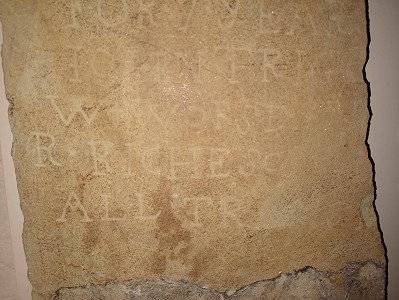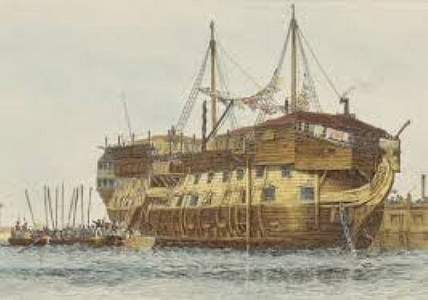Richard Richardson, prisoner

Names on stone

Prison hulk
On display in Lincoln Castle is a stone that had been on the wall of the prison exercise yard, and carved on it are the names of four prisoners. The information board tells us that one of these four, Richard Richardson from Alvingham near Louth, had stolen three sheep skins and a calf skin.
In 1808, these men had been sentenced by the court at Lincoln to transportation to Australia for seven years, and they were taken to the Prison Hulk “Captivity” moored in Portsmouth. Sending prisoners to the colonies addressed the problem of overflowing prisons and was more humane than hanging. Old warships, no longer seaworthy, and known as hulks were used to house the convicts before the long sea voyage.
But Richard never set off for Australia because in 1808 the ships normally used for transportation were needed for service in the Napoleonic wars. The four prisoners from Lincoln were therefore pardoned and released after serving a short sentence.
I wondered what happened to Richard after that. Other records tell us that he returned to Alvingham and in 1816 he married Mary Wilson in South Cockerington. They had three children: the first in 1817 in Alvingham; and then two in Louth in 1919 and 1821, respectively. The family must have moved from Alvingham to Louth in about 1818, a time when many unskilled people were moving to the town in search of work.
In the church records, Richard was described as a labourer. The rate books show that he and his family lived in a small, rented cottage in Aswell Hole in Louth, at the western end of the Gatherums. These poor-quality cottages were inhabited by the most impoverished members of society, and the area was known for its brothels. Numerous newspaper reports describe unruly behaviour here, and indeed, an 1837 report tells us that Richard Richardson was fined £5 for being drunk and disorderly in the streets - £5 was a lot of money. I wonder if he was sent to Louth prison because he couldn’t pay.
It is unusual to have a description of a working-class man, but for Richard we do, because in 1854 and 1855 there were newspaper reports of two separate disputes involving him. He was then in his late 70’s and described as “poor, lame and infirm”, but he could walk to his gardens near Hubbard’s Hills, a long way from his home, and he was still feisty. The second report states, “Richardson and the defendant had a dispute about some coals which the defendant had carried for him from the River Head, and Richardson struck the defendant’s horse, which he was driving, upon which the defendant horsewhipped Richardson, when a regular battle ensued, the defendant being armed with a whip, and Richardson with a stick, much to the amusement of the bystanders. Case dismissed.”
Richard Richardson lived to a surprisingly old age for someone impoverished, lame and infirm; he died in 1861, age 84.
Ironically, a couple of decades after Richard Richardson was given his sentence of transportation, Ishmael Croft, another labourer from Alvingham, was transported to Australia in 1836, as described in our blog of August 2023.